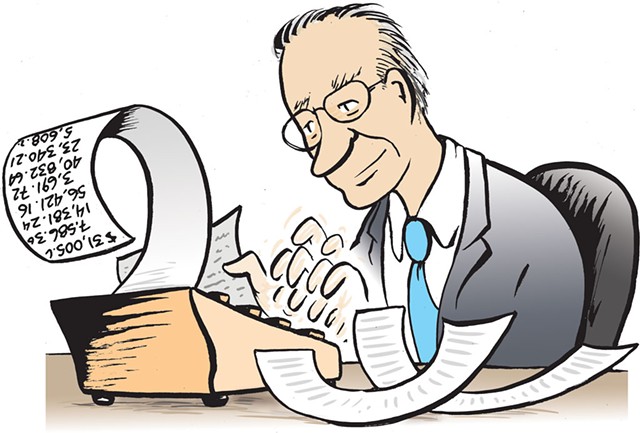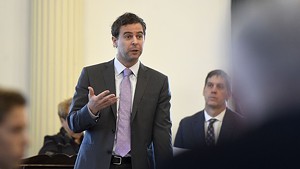
- Tim Newcomb
Time was when the most boring reporting assignment in Montpelier would have been to cover state auditor Alexander "Tino" Acebo, a Barre Republican who held the job from 1970 to early 1993. A classic green-eyeshade, no-news-is-good-news number cruncher, Acebo, who died in 2019, coasted from one reelection to the next without generating a headline.
That all changed after a brash, ambitious, liberal Democrat, Ed Flanagan, got elected to the job in 1992 upon Acebo's retirement. Flanagan, who died in 2017, began issuing non-audit performance reviews about all the mismanagement he said he was finding in state agencies, much to the annoyance of the Democratic governor, Howard Dean. Flanagan started attracting a lot of press, including a 1995 interview with this journalist in which he became the first statewide elected official in the country to say publicly that he was gay.
Flanagan's reports attracted not only news coverage, but also lots of pushback — often from the subjects of his critical reviews — questioning both his methods and his motivation. A desire to make a name for himself? Well, Flanagan did run for the U.S. Senate in 2000, losing to incumbent Republican senator Jim Jeffords.
Now, Doug Hoffer, auditor since 2013, is attracting the same sort of criticism. People targeted in his investigations, their allies and others not keen on having progressive Democrats in statewide office have been crying, "Audit the auditor!" They've questioned Hoffer's methods. And they've asked whether his background in left politics, including his work as a number cruncher for Burlington's Peace & Justice Center, has hurt his objectivity.
U.S. Sen. Bernie Sanders (I-Vt.) and other progressives have railed for decades against government handouts to affluent businesses, calling it "corporate welfare." As auditor, Hoffer has questioned whether the state is undercharging ski areas for leases of public land, and whether Vermont is too generous with grants earmarked for businesses that promise to create jobs. Audits such as those have been weaponized by people who portray him as marching in Sanders' parade.
"With some portion of the population, you lose your credibility, and ... that relates to the perception of how independent you are, and the value one assigns [to] your opinion and the work that you do," said Senate Minority Leader Randy Brock (R/D-Franklin), who served as auditor from 2005 to 2007.
Brock said an auditor's work product should be something another auditor could replicate to reach the same conclusions, which he said does not always appear to be the case with Hoffer's work.
Former state representative Oliver Olsen, a Londonderry independent, served until four years ago on the board of trustees of Burr and Burton Academy in Manchester, one of Vermont's "independent," or private, schools that Hoffer recently scrutinized. Olsen hasn't attacked that part of Hoffer's work, but he recently issued a "review" of a Hoffer report on health care that reads like a scathing auditor's review.
"Issue 1: Data and analysis not readily available for public review and verification," Olsen announced in a section heading. He added below: "This makes it impossible to verify the accuracy of your analysis against source data." He also questioned Hoffer's math. "Starting on page 1, there is a claim that spending on healthcare services in Vermont was 167% higher in 2018 than 2000. This is false — the correct figure is 160.77 % — six points lower than what you stated in the report."
Hoffer responded with a point-by-point rebuttal, saying, for example, that Olsen was using the wrong data set from the federal Bureau of Economic Analysis. BEA data are massaged from time to time; Hoffer said Olsen was simply using a different snapshot-in-time of the federal data to argue that Hoffer had gotten it wrong.
But few critical responses to Hoffer's work have been more pointed than a recent one from Joan Goldstein, Vermont's commissioner of economic development. She was responding to Hoffer's latest critique of the Vermont Employment Growth Incentive. That's the aforementioned program that promises grants to businesses that agree to create jobs — grants that are awarded if the state tax department later confirms those jobs have been created.
Hoffer has issued multiple reports focusing on what he sees as VEGI's inadequate "but-for" test, as in: How do we know this business wouldn't have created these jobs even without the state support and that the money being shelled out isn't a waste of taxpayer dollars?
"Why would we pay them for something they were going to do anyway?" Hoffer asked in a Fair Game interview. "Every applicant is required to self-attest that yes, absent this incentive, I would not [add jobs], and here's why."
Hoffer went on, "Well, that is confidential information, but I have access to it, and I looked it over for five different applicants. And in my opinion — I mean, the question was, what does [the Vermont Economic Progress Council, which reviews the applications] do to validate, or attempt to validate, the assertions by these applicants? It's kind of important. And the answer is: virtually nothing."
In his report, Hoffer included a chart that almost appeared designed to get under the skin of anyone who cringes at the "corporate welfare" charge. It compares the hoops someone has to go through to get an average of $473 a month in Reach Up public assistance benefits to the scrutiny given a business applying for a VEGI grant, which averaged $852,757 through 2019.
One example: Applicants for public assistance are asked whether they ever have been convicted of beneficiary fraud. But a business applying for VEGI money is not asked whether it ever has been convicted of violating tax, environmental or labor laws, Hoffer reported.
Goldstein wasn't having it. "It is quite unusual that one would compare a human services program for individuals and families with an economic incentive for growth of a particular business to create jobs and capital investment," she wrote in an email to Fair Game, calling the comparison "apples and oranges." She also said Hoffer failed to provide a comprehensive list of the requirements that VEGI applicants must meet to win the state's largesse.
Hoffer's chart asks the reader to consider who has the easier time: businesses applying for state job-creation grants or poor folks applying for public assistance.
Hoffer said none of this is political at all; his only goal is to report the facts. "Last time I checked, facts are not political or ideological," he said.
"I have a 25- or 30-year reputation as a data guy — that's who I am," he said. "Do I have my own views about politics? Of course. But my work has never been about politics. It's been about public policy and evaluating programs and policies to determine if they're cost-effective. That is not politics."
Is it ambition that calls Hoffer, 69, to rattle cages?
Related Vermont Sues OneCare to Obtain Payroll Records for Auditor

"I've made it clear," he said. "I'm not looking for any other job. This is it. I sought this job because it seemed to be a good fit with my work prior to being elected and [with] my interests, which are asking hard questions about the effectiveness and efficiencies of state policies and programs, and that's exactly what I'm doing."
However you'd describe Hoffer's approach, it seems to be OK with most Vermonters. He won nearly 72 percent of the vote on November 3 over Cris Ericson, who ran under the Progressive banner despite the objections of Progressive leaders. Ericson actually placed third, behind Hoffer and "blank votes," according to the secretary of state's election results.
Even if Hoffer does seem political at times, that's just fine, said former House speaker Mitzi Johnson. "Yes, he goes at things with his set of values, but that's part of the political process," the Democrat said. "Voters look at a variety of candidates that have various values, and they choose which values they want in office."
And as for pitting the hurdles to be cleared by public assistance applicants versus those facing business-grant seekers? "I don't think that it is unreasonable in any way to say, 'OK, look, here are two functions that the state is responsible for — safety nets and economic development — and, yeah, let's compare 'em. Let's see what each receiving entity has to go through,'" Johnson said.
Two low-income Vermonters who have leaped through the hoops to get state help also said they were fine with Hoffer's approach.
"As somebody who has worked full time while applying for food stamps, it's like hell," said Belynda Jestice, a single mom and childcare worker from Marshfield. The challenges have been heightened during the pandemic, she said. "You can turn in your three most recent paycheck stubs, but if it doesn't match the dates of the times they're looking for when you apply, they will not accept it."
Christie Delphia of Burlington, who has needed food assistance to nourish her five kids, said of the Department for Children and Families, "They'd ask you the same question worded several different ways to see if they could trip you up. It was quite degrading." She added, "They should be putting these businesses through the same hoops. It's only right if they're going to be getting some help."
Economists define "moral hazard" as the tendency to take more risks if you're personally protected from a bad outcome. In the insurance industry, underwriters worry that policy holders might be reckless, knowing their insurers will pay any losses. This principle also applies to government officials handing out money. Those are taxpayers' dollars, not their own.
The situation demands accountability. The press tries, but newsrooms lack the elected auditor's staff and their training, as well as the auditor's subpoena power. The public should be glad there's a state auditor's office, and even more so when its occupant doesn't mind annoying people.
Media Note: Suozzo's Swan Song
Our data editor, Andrea Suozzo, is leaving our team to join the nationally focused investigative newsroom ProPublica. It's a bummer for Seven Days but good for her.
Suozzo, who joined the paper in 2014, has been the computer whiz who provided the foundation for several of Seven Days' most ambitious and data-heavy projects in recent years. Those include "Give and Take," the paper's series on Vermont nonprofits, and "Worse for Care," a collaborative effort with Vermont Public Radio that collected five years' worth of inspection and complaint documents on Vermont's eldercare homes. The latter project won a national Edward R. Murrow Award for investigative journalism.
"I'm excited about this new adventure, but I'll miss this ambitious, creative crew at Seven Days so much," Suozzo told Fair Game. "I've learned a lot from everyone here, and I so appreciate the room this place gave me to grow and learn and imagine new roles for myself. And, of course, I'll continue to be a loyal reader."
News editor Matthew Roy said the paper is searching for Suozzo's replacement.
She'll get to stay in Vermont while working for the New York-based ProPublica because, hey, it's remotely possible. It's a cool career move for someone the Seven Days crew holds in very high esteem.













Comments
Comments are closed.
From 2014-2020, Seven Days allowed readers to comment on all stories posted on our website. While we've appreciated the suggestions and insights, right now Seven Days is prioritizing our core mission — producing high-quality, responsible local journalism — over moderating online debates between readers.
To criticize, correct or praise our reporting, please send us a letter to the editor or send us a tip. We’ll check it out and report the results.
Online comments may return when we have better tech tools for managing them. Thanks for reading.